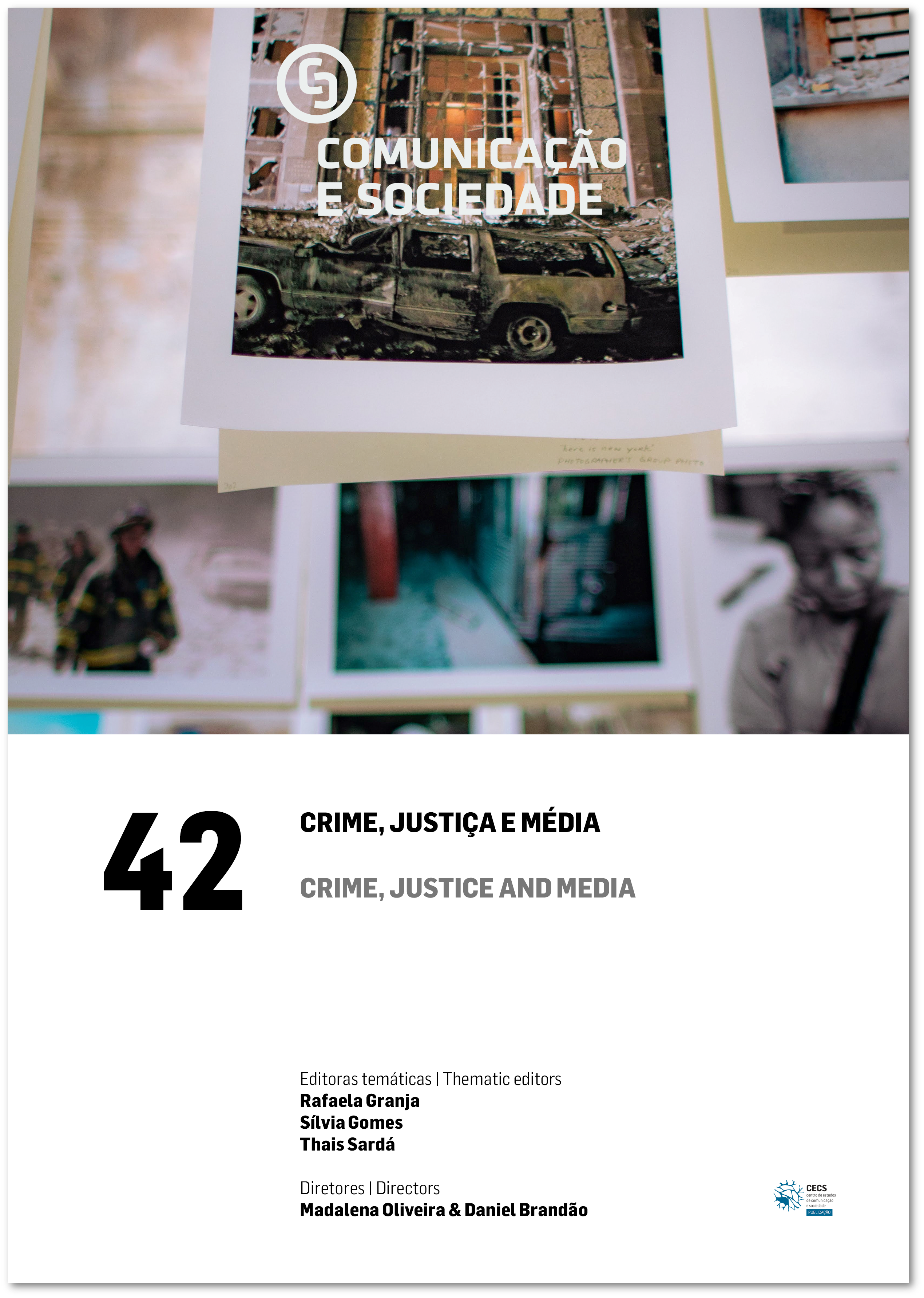Towards a History of Portuguese Literary Journalism: Reporters and Writers Throughout Time
DOI:
https://doi.org/10.17231/comsoc.42(2022).4066Keywords:
literary journalism, history, communication, literatureAbstract
Journalism and literature have always maintained a close relationship. While some literary works resemble the journalistic style of reporting on the present, some written reports are true literary works thanks to a narrative that exceeds the techniques of conventional journalism. It is within this framework that one can talk about literary journalism, journalism written by journalists (and not journalism written by writers or about journalists), which, following the rules and requirements that define the profession, makes room for the use of techniques typically associated with literature.
Portugal has a long literary journalism history, and journalists who are distinguished by this style. This study seeks to offer a diachronic view of Portuguese literary journalism through an analysis of its development, from the end of the 19th century and across the First Republic, the Estado Novo, after April 25, to the present day. At the same time, we will consider different examples of international literary journalism to establish a possible definition for the topic.
Downloads
References
Acciaiuoli, M. (2013). António Ferro: A vertigem da palavra. Bizâncio.
Anderson, S. (2017). Fractured lands: How the Arab world came apart. Picador.
Aniceto, A. (2007). Grandes batalhas da história de Portugal: 1914–1918 Grande Guerra. Expresso.
Bak, J. S., & Reynolds, B. (Eds.). (2011). Literary journalism across the globe. University of Massachusetts.
Baptista, C., & Correia, F. (2007). Jornalistas: Do ofício à profissão. Mudanças no jornalismo português (1956-1968). Caminho.
Baptista-Bastos, A. (2002). Convite ao testemunho das ideias. In H. S. Freitas (Ed.), Jornalismo e literatura: Inimigos ou amantes? (pp. V–IX). Peregrinação Editores.
Baptista, C., & Correia, F. (2009). Memórias vivas do jornalismo. Caminho.
Carvalho, P. (2018). Ainda aqui estou. Fundação Francisco Manuel dos Santos.
Coelho, A. L. (2011). Tahrir – Os dias da revolução. Tinta-da-China.
Coelho, A. L. (2013). Vai, Brasil. Tinta-da-China.
Coutinho, M. (2018). 21st century literary journalism: Narrative techniques and the concept of plot and hero [Tese de doutoramento, Universidade Nova de Lisboa]. Repositório Universidade Nova. http://hdl.handle.net/10362/49928
Delgado, I. (1987). Iva Delgado: À vista da fronteira portuguesa. In M. Neves (Ed.), A chacina de Badajoz (pp. 69–76). Edições “O Jornal”.
Ferreira, R. (1918, 15 de dezembro). Pormenores da tragédia: A morte do presidente da república. O Século, 13(294), 1–2.
Ferreira, R. (1974). Táxi n.º 9297. Arcádia.
Ferro, A. (1927). Viagem à volta das ditaduras. Empresa do Diário de Notícias.
Ferro, A. (1933). Salazar, o homem e a obra. Emprêsa Nacional de Publicidade.
Fiadeiro, M. A. (1983). Cadernos de reportagem nº 3 – Aborto: O crime está na lei. Relógio d’Água.
Godinho, J. (2009). As origens da reportagem – Imprensa. Livros Horizonte.
Herr, M. (1977). Dispatches. Vintage.
Hersey, J. (1946). Hiroshima. Penguin Books.
Kerrane, K. (1998). Making facts dance. In B. Yagoda & K. Kerrane (Eds.), The art of fact (pp. 17–20). Touchstone.
Kramer, M. (1995). Breakable rules for literary journalists. In N. Sims & M. Kramer (Eds.), Literary journalism (pp. 21–34). Ballentine.
Maciel, A. (1963). Angola heróica. Livraria Bertrand.
Marinho, M. J. (1988). Introdução. In J. B. Reis (Ed.), Revista inglesa: Crónicas (pp. 9–18). Dom Quixote.
Marques, R. (2017, 18 de junho). A estrada mais triste de Portugal. Expresso. https://expresso.pt/sociedade/2017-06-18-A-estrada-mais-triste-de-Portugal-2
Martins, O. (1951). A Inglaterra de hoje: Cartas de um viajante. Guimarães Editores.
Melo, G. (1983). Cadernos de reportagem nº 1 – Ser homossexual em Portugal. Relógio d’Água.
Moura, P. (2013). Longe do mar. Fundação Francisco Manuel dos Santos.
Moura, P. (2016). Extremo ocidental. Elsinore.
Neves, H. (Ed.). (1910). Como triumphou a república. Subsídios para história da revolução de 4 de outubro de 1910. Letra Livre.
Neves, M. (1985). A chacina de Badajoz. Edições “O Jornal”.
Ortigão, R. (1887). As farpas (Vol. 1). Typographia Universal.
Ortigão, R. (1943). John Bull: O Processo Gordon Cumming, Lord Salisbury e correlativos desgostos. Livraria Clássica Editora.
Page, M. (2008). A primeira aldeia global (G. A. Palma, Trad.). Casa das Letras. (Trabalho original publicado em 2002)
Pereira, C. S. (1924). Noite sangrenta. Bertrand.
Queirós, E. de. (2000). Cartas de Inglaterra e crónicas de Londres. Livros do Brasil.
Ramos, R. (Ed.). (2009). História de Portugal. A Esfera dos Livros.
Reis, J. B. (1988). Revista inglesa: Crónicas. Dom Quixote.
Rodrigues, A. D. (1980). A comunicação social – Noção, história, linguagem. Editorial Vega.
Rosa, V. C. (2019). A cidade de Lisboa no jornalismo literário de Fialho de Almeida [Tese de doutoramento, Universidade de Lisboa]. Repositório da Universidade de Lisboa. http://hdl.handle.net/10400.5/19107
Siegel, L. (2016, 5 de dezembro). In a time of many questions literary journalism provides an answer. Columbia Journalism Review. https://www.cjr.org/special_report/literary_journalism_trump_president.php
Soares, I. (2011). Literary journalism’s magnetic pull: Britain’s “new” journalism and the Portuguese at the fin-de-siècle. In J. S. Bak & B. Reynolds (Eds.), Literary journalism across the globe (pp. 118–133). University of Massachusetts.
Soeiro, E. (1968, 12 de outubro). Hoje no México. Jornal Notícia: Semanário Ilustrado, 462, pp. 14-21.
Soeiro, E. (1968, 26 de outubro). México: capital olímpica do mundo. Jornal Notícia: Semanário Ilustrado, 464, pp. 33-49.
Soeiro, E. (1968, 2 de novembro). A maior queda de recordes. Jornal Notícia: Semanário Ilustrado, 465, pp. 36-51.
Sucena, E. (1996). O fabuloso Repórter X. Vega.
Ventura, A. (1910). Notas vivas de um repórter inovador. In H. Neves (Ed.), Como triumphou a república. Subsídios para história da revolução de 4 de outubro de 1910 (pp. I–VI). Letra Livre.
Ventura, I. (2007). A emergência das mulheres repórteres nas décadas de 60 e 70 [Dissertação de mestrado, Universidade Aberta]. Repositório Aberto. http://hdl.handle.net/10400.2/559
Ventura, I. (2012). As primeiras mulheres repórteres. Tinta-da-China.
Wolfe, T. (1973). The new journalism. Picador.
Downloads
Published
How to Cite
Issue
Section
License
Copyright (c) 2022 Manuel Carvalho Coutinho

This work is licensed under a Creative Commons Attribution 4.0 International License.
Authors own the copyright, providing the journal with the right of first publication. The work is licensed under a Creative Commons Attribution 4.0 International License.












